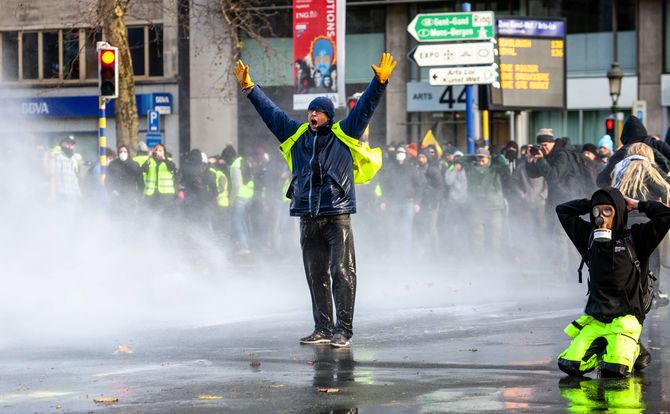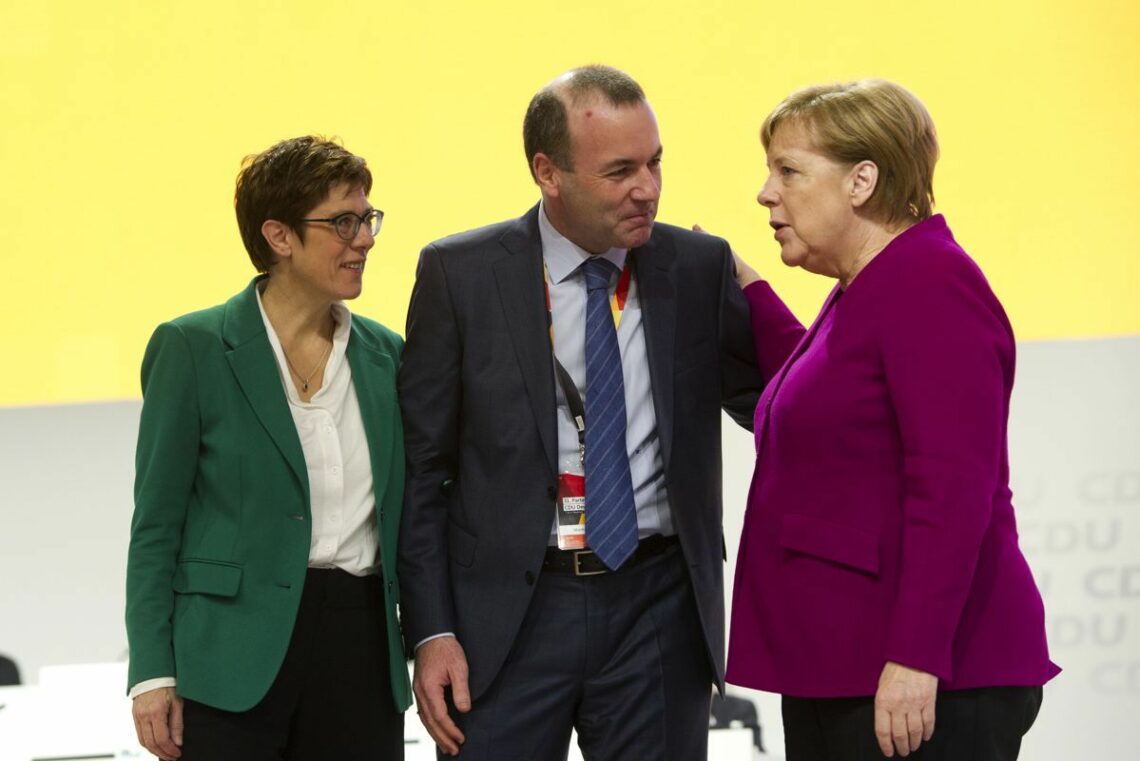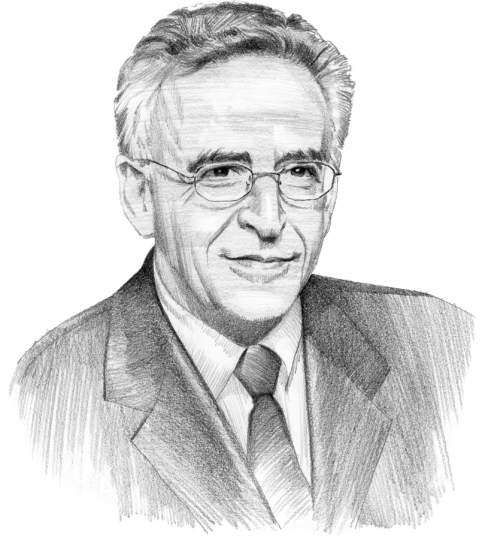2019 Global Outlook: Europe’s year of living dangerously
There are plenty of challenges ahead for the EU in 2019. The economic slowdown and the makings of another financial crisis are just a few of them. For EU institutions, perhaps the biggest test will come with the European Parliament elections in May, which could overturn the grand coalition that has governed the bloc since the 1980s.

In a nutshell
- The European Union must cope with many external and internal challenges in 2019
- The internal challenges may prove tougher with European Parliament elections in May
- Losses by mainstream parties could produce a swing toward more “populist” positions
- Even in the best case, the vote will produce delay in tackling pan-European issues
2019 is shaping up to be a dangerous year for Europe. Among the signs of trouble: unstable leadership, rampant populism, strikes and demonstrations, terrorist outbreaks, migration disputes, an economic slowdown, currency swings, the makings of another financial crisis, Brexit surprises, security challenges (hybrid or otherwise) to the east and south, and not least – a battered American president, lashing out at real and imagined adversaries on the old continent. Like Canada, the European Union may also be dragged into Washington’s escalating trade war with China.
The “Franco-German” locomotive will sputter and euroskepticism will grow, restrained only by fear of replicating the Brexit mess. The French president, chastened by the Yellow Vest protests, will try to reclaim his role as a champion of liberal reform, with desultory support from Germany’s lame-duck chancellor. Matteo Salvini, head of the anti-migration, anti-EU League (Lega), will contend for the imperial crown in Rome. Spain will struggle on with a minority government and separatist brawls. In Central Europe, tragedy (Budapest/Warsaw) will vie with farce (Prague). Vladimir Putin will rub his hands in glee.
Dodging bullets
But all is not lost. The United Kingdom will step back from the cliff’s edge and the chaos of a no-deal Brexit should be avoided. London may well delay Brexit, either by asking the EU-27 to prolong the negotiations or even by canceling Britain’s withdrawal notice, while Prime Minister Theresa May fumbles for a new formula. This may well require a second referendum.
European Central Bank President Mario Draghi will use his remaining firepower to sustain economic growth and avert a financial crisis in Italy, before retiring in October. Ireland and Portugal will prove that Europe’s periphery can be as strong as its core, at least when it really wants to. Fewer migrants will set forth for Europe in flimsy craft and Brussels will use its meager instruments to preserve the rule of law in wayward lands. Balkan hopefuls will press their cases for EU accession, demonstrating that some people still want to join while others leave. Turkish President Recep Tayyip Erdogan will move further away from the EU, relying on U.S. President Donald Trump to save him from too close an embrace with the Russian bear.
The EU’s main event in 2019 will be the European Parliament elections on May 23-26.
The master of the Kremlin will discover that saber rattling means little to an aging population with shrinking pensions, even as he plots his own exit strategy and a plush retirement a few years from now. Meanwhile, punitive tariffs will not protect President Trump from an implacable prosecutor, an increasingly hostile Congress and angry workers in sunset industries.
Imperiled majority
The EU’s main event will be the European Parliament elections on May 23-26. The grand coalition of conservatives (EPP) and socialists (PES) that has dominated EU institutions since the 1980s may lose its majority. Would-be kingmakers include, on the center-right, the shaky coalition between the liberals (ALDE), French President Emmanuel Macron’s “Europe on the Move,” and Spanish conservative upstarts (“Citizens”). On the center-left, the greens (Greens/EFA) are walking a tightrope between ecological correctness and realpolitik.
After the elections, some right-wing nationalists in the European Parliament may put aside their squabbles, for a while, to lay claim to a share of the institutional spoils – committee chairs, staff and financial resources. The EPP, fearful of losing seats to nationalists, will cling to Hungarian Prime Minister Viktor Orban’s Fidesz party, despite the European Parliament’s vote to trigger a sanctions procedure against Hungary for rule-of-law violations.

The EPP and PES will demand that the “lead candidate system” (Spitzenkandidaten), employed for the first time in 2014, again be used by the heads of government to nominate the future president of the European Commission. If the EPP emerges from the election with the largest number of seats, it will therefore expect its lead candidate, Manfred Weber, to become the Commission’s president.
But Mr. Macron dislikes the improvised lead candidate arrangement, which he sees as usurping the prerogatives of the heads of government. German Chancellor Angela Merkel went along with Mr. Weber’s designation as the conservatives’ lead candidate, but she has not endorsed him for Commission president. The euroskeptic populists, who might become the second- or third-largest group after the May election, also dislike the federalist Spitzenkandidaten device.
Bargaining pause
In June, the heads of government would normally nominate the president of the Commission, in a package that includes the high representative for foreign affairs and security policy, as well as the presidents of the European Council, the European Parliament and the ECB. The post of NATO secretary-general comes up for renewal in October, forming part of the wheeling and dealing on top European jobs.
However, this process may be delayed if President Macron persuades other heads of government to nominate a European Commission president who is not the “lead candidate” of the largest political group in the new European Parliament. He claims that Europe’s disenchanted voters want a fresh face that appeals to younger generations and has praised Margrethe Vestager, the Commission’s antitrust campaigner and former Danish deputy prime minister, although she does not enjoy support from Denmark’s current prime minister, Lars Lokke Rasmussen.
The European Parliament elections will affect the course of Brexit, national politics and unfinished EU business.
If the European Council clashes with the European Parliament over Spitzenkandidaten, the inauguration of a new Commission, scheduled for October, could be delayed, with Mr. Juncker’s team staying on as caretakers. In a Europe reeling from Brexit, and with eurozone, trade, migration, security and populist challenges on the horizon, the EU could ill afford such a delay. So, President Macron will compromise if a French candidate is nominated as head of the Commission or the ECB.
The European Parliament elections will affect the course of Brexit, national politics in EU member states, and unfinished EU business. The election campaign, the elections themselves, hearings of Commission nominees in the parliament, and the new Commission’s running-in period will preclude any substantial negotiations between the EU and the UK on their future partnership before early 2020. Britain could face another cliff edge on July 1, 2020, when a decision on prolonging the transitional standstill, to allow more time to negotiate the future partnership, is due under Britain’s problematic withdrawal agreement.
Knock-on effects
The European Parliament elections will have a major psychological impact on national politics. Each member state is free to choose its own system for electing members of parliament, provided it is a form of proportional representation. In some countries, this is the only nationwide ballot conducted under proportional representation. This enabled the United Kingdom Independence Party (UKIP) and the far-right French National Front, now National Rally, to “win” the 2014 European Parliament elections in their respective countries. There would be shock waves throughout Europe if the National Rally tops the French poll and Mr. Salvini’s League does the same in Italy, while nationalist parties do well in Germany and elsewhere.
The election will also affect unfinished EU business. The current Commission president, Mr. Juncker, would like to sew up a deal on the EU’s spending plans for the next seven years, the Multiannual Financial Framework (MFF), before he leaves office. But this seems unlikely. Budget cuts caused by Brexit and higher contributions by remaining net contributors are causing ructions. Commission proposals for rule-of-law conditionality on grants from the structural funds are supported by tightfisted northern member states but opposed by Central Europeans, the main beneficiaries. Poland, the biggest recipient of these EU “cohesion” funds, will fight fiercely to preserve its share, worth 2.4 percent of its gross domestic product (GDP) over the most recent seven-year period.
Mainstream parties will respond to their opponents by shunning initiatives involving more Europe.
Ambitious plans put forward by Mr. Macron and Mr. Juncker on a long list of issues – immigration, asylum and border management, security and defense, the euro, capital markets union, the digital single market, competitiveness, artificial intelligence, science, research, education and trade – could all be affected by an electoral swing toward more “populist” positions. Mainstream parties will respond by shunning initiatives involving “more Europe.”
Moderating risk
Thanks to the European Parliament elections and a broader generational change in politics, 2019 could be a disruptive year for the EU. However, risks can be moderated if the Union’s new political leadership pushes back against populism. This means stricter enforcement of the rule of law in the member states, more focus on social justice and the future of work, and better use of the EU’s external policy instruments.
Brexit will make EU-NATO cooperation a high priority. If and when Brexit occurs, the EU and the UK should start work quickly on a wide-ranging future partnership in security and defense as well as trade, recognizing that it will take many years to complete.
The next class of EU leaders should beware of hollow slogans (“a Europe which protects”) and concentrate instead on tangible results that improve the daily lives of their fellow citizens. 2019 might then be remembered as a year of integration rather than disintegration.








